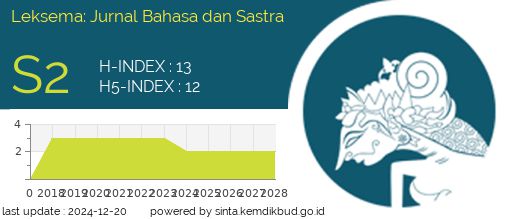EXPRESSIVE SPEECH ACTS IN 'LAKON POLITIK REPUBLIK' EPISODE OF 'MATA NAJWA' TALKSHOW
DOI:
https://doi.org/10.22515/ljbs.v5i1.1853Keywords:
pragmatics, expressive speech act, illocutionary act, politicsAbstract
The objectives of this research are to find out the types of expressive speech act and the forms of expressive speech act in Mata NajwaTalkshow: Lakon Politik Republik Episode. It is interesting to analyze expressive speech since all the human beings are given a feeling by God and they tend to express their psychological feeling. Feeling is strictly related to expressive speech act. Kreidler and Frank’s theory about expressive speech act was used in this research .This research belongs to qualitative. Furthermore, the data of this research are the utterances containing expressive speech act in Mata Najwa Talkshow: Lakon Politik Republik Episode. In collecting the data, the researchers decide to use documentation technique. The four researchers analyze the data by identifyingand classifying the data into types and forms of expressive speech act.  The results are 13 types of expressive speech act and 2 forms of expressive speech act are found in this research. The types are thanking, regretting, apologizing, praising, liking, disliking, approving, disapproving, condoling, criticizing, boasting, lamenting, blaming. The forms of expressive speech act found by the researchers are declarative and interrogative.
Downloads
References
Altikriti, Sahar Farouq. 2011. "Speech Act Analysis to Short Stories." Journal of Language Teaching & Research, 2 (6)
Austin, John L. 1962. How to Do Things with Words (The William James Lectures). Cambridge: Harvard University Press
Black, Elizabeth. 2005. Pragmatic Stylistics. Edinburgh: Edinburgh University Press
Frank, Marcella. 1972. Modern English: A Practical Reference Guide. Englewood Cliffs: Prentice Hall
Handayani, Nur Vita. 2015. “ The Use of Expressive Speech Acts in Hannah Montana Session 1â€. Register Journal, 8 (1): 99-112
Kreidler, Charles W. 1998. Introducing English Semantics. London: Routledge
Kreidler, Charles W. 2004. The Pronunciation of English: A Course Book in Phonology. New York: Basil Blackwell
Leech, Geoffrey. 1983. Principles of Pragmatics. London: Longman
Leech, Geoffrey. 2014. The Pragmatics of Politeness. Oxford: Oxford University Press
Lunenburg, Fred C. 2010. “Communication: The Process, Barriers, and Improving Effectivenessâ€. Schooling, 1 (1): 1-10
Mata Najwa. 2016. “Lakon Politik Republik†(Talkshow). www.metrotevnews.com. Retrieved March 14, 2017
Moleong, Lexy J. 2009. Metodologi Penelitian Kualitatif. Bandung: PT Remaja Rosdakarya
Searle, John R. 1969. Speech Acts: An Essay in the Philosophy of Language. Vol. 626. Cambridge: Cambridge University Press
Sutopo, HB. 2006. Metodologi Penelitian Kualitatif: Dasar Teori dan Penerapannya dalarn Penelitian. (Edisi 2). Surakarta: UNS Press
Utami, Pradiptia Wulan, Nani Darmayanti, & Sugeng Riyanto. 2013. "Expressive Speech Act of Judges' Narratives in X-Factor Indonesia Talent Show on RCTI: A Pragmatic Study." International Journal of Language Learning and Applied Linguistics World (IJLLALW), 4 (4): 543-561
Yule, George. 2010. The Study of Language (4th Edition). Cambridge: Cambridge University Press. https://doi.org/10.1007/s13398-014-0173-7.2
Downloads
Published
Issue
Section
License
The copyright of the received article shall be assigned to the publisher of the journal. The intended copyright includes the right to publish the article in various forms (including reprints). The journal maintains the publishing rights to published articles.
In line with the license, the authors and users (readers or other researchers) are allowed to share and adapt the material only for non-commercial purposes. In addition, the material must be given appropriate credit, provided with a link to the license, and indicated if changes were made. If authors remix, transform or build upon the material, authors must distribute their contributions under the same license as the original.







